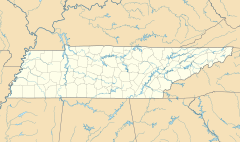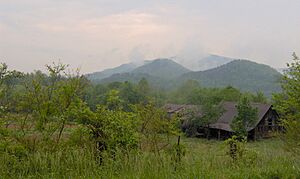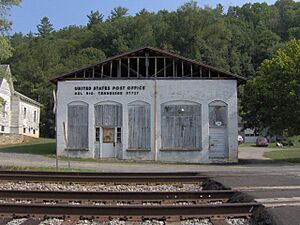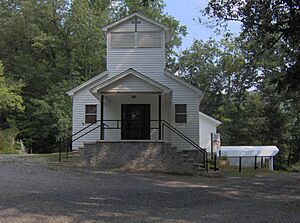Del Rio, Tennessee facts for kids
Quick facts for kids
Del Rio, Tennessee
|
|
|---|---|
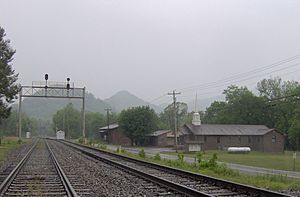
Del Rio, Tennessee
|
|
| Country | United States |
| State | Tennessee |
| County | Cocke |
| Elevation | 1,132 ft (345 m) |
| Population
(2000)
|
|
| • Total | 2,138 |
| Time zone | UTC-5 (Eastern (EST)) |
| • Summer (DST) | UTC-4 (EDT) |
| GNIS feature ID | 1328045 |
Del Rio is a small place in Cocke County, Tennessee, United States. It's called an unincorporated community, which means it doesn't have its own local government like a city or town. In 2000, about 2,138 people lived in the area served by Del Rio's ZIP Code (37727).
Contents
Who Lives in Del Rio?
In 2000, the Del Rio area had 2,138 people. Most residents (about 98.2%) were White. A small number of people were Native American or African American. About 0.7% of the population were of Hispanic or Latino background.
The average age of people in Del Rio was around 39.7 years old. The population was almost evenly split between males (50.5%) and females (49.5%).
Exploring Del Rio's Geography
Del Rio is located where the French Broad River meets a smaller stream called Big Creek. The main part of the community is now found near the crossing of U.S. Route 70 and State Route 107, along the north side of the French Broad River.
The Appalachian Mountains surround Del Rio on all sides. These mountains and the river have greatly shaped the area's history and culture. For example, Stone Mountain rises about 2,000 feet (610 meters) above Del Rio to the west. Other tall mountains like Snowbird Mountain and Max Patch Bald are to the south. These mountains are part of the Appalachian Trail, a famous long-distance hiking path. Much of the land to the south and east of Del Rio is part of the Cherokee National Forest.
Del Rio is about 10 miles (16 km) west of Newport, Tennessee, and almost 15 miles (24 km) east of Hot Springs, North Carolina. It's roughly halfway between the larger cities of Knoxville, Tennessee, and Asheville, North Carolina.
Around Del Rio, you'll find smaller communities that grew as early settlers spread out. These include Nough (sometimes called "Slabtown") along Big Creek, Paint Rock further up the French Broad River, and Harmony Grove. A famous opera singer and actress named Grace Moore was born in Nough in 1898.
A Look at Del Rio's Past
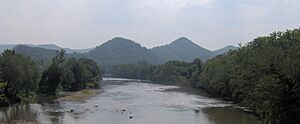
Early Days and Settlers
Long ago, a Native American village stood where Del Rio is today, along the French Broad River. Many artifacts from this village have been found in the area.
The first European settler in this area was John Huff, who arrived around 1784. He was a soldier from the American Revolution. John and his wife built a small fort called Huff's Fort. This fort became a stopping place for stagecoaches traveling between Knoxville, Tennessee, and Warm Springs (now Hot Springs) in North Carolina. The community that grew around it was first known as Big Creek.
Another Revolutionary War veteran, Jehu Stokely, also settled nearby. His family later became very important in the area.
As more settlers arrived, there were some conflicts with the Cherokee people, who had lived there for centuries. To protect themselves, settlers built several forts and blockhouses along the French Broad River, including Huff's Fort.
The 19th Century and a New Name
As the area became safer, Big Creek grew into a popular stop for pioneers traveling through the mountains. The Huff family turned their fort into an inn, and the Stokely family opened a trading post. Many early settlers raised cattle and drove them across the mountains to sell.
A big change came in 1868 when the Southern Railway built a railroad line through the area. A train station, Big Creek Station, was set up in 1870. However, there was another town in Tennessee already called "Big Creek," which caused confusion for mail. So, the town decided to change its name. After thinking about different ideas, they chose Del Rio, which means "by the river" in Spanish.
With the railroad, Del Rio became a major center for shipping lumber and shingles. The demand for wood was very high, and new tools like the band saw helped the lumber industry boom. By 1900, Del Rio was at the heart of a large logging operation, with lumber camps deep in the mountains.
The 20th Century and Changes
In 1911, a law called the Weeks Act helped stop the huge logging operations in the Southern Appalachians. This caused Del Rio's economy to slow down. Also, the new Interstate 40 highway was built farther south, so less traffic passed through Del Rio. This meant fewer travelers stopped in the town, and its busy atmosphere faded.
Historically, some people in the Appalachian mountains, including Del Rio, made their own homemade liquor, sometimes called moonshine. This was often a way for farmers to earn extra money when farming was difficult.
Education in Del Rio
Children in Del Rio attend Del Rio Elementary School, which is part of the Cocke County Schools system. It serves students from kindergarten through 8th grade.
For high school, students travel to Cocke County High School in Newport.
 | Charles R. Drew |
 | Benjamin Banneker |
 | Jane C. Wright |
 | Roger Arliner Young |


